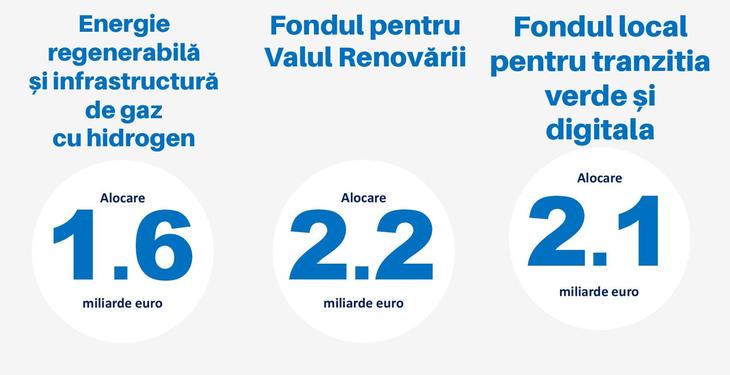Romanian National Plan for Recovery and Resilience (NPRR) was sent to Brussels, in an electronic format, announced the minister of Investments and European Projects Cristian Ghinea. It will be evaluated for at least two months by European Commission experts, and the first financial allocations could reach Romania this autumn.
The plan has a total budget of €29,2 billion for actions to be completed by 2026. The brief description provided by the authorities lists more than 40 reforms and over 70 investments. A more detailed description is expected on June 2nd when the entire document will be released for public scrutiny.
The allocation for renewable energy and hydrogen gas infrastructure is €1,6 billion, for 7 reforms and 7 investments. The examples provided by the government are the development of power generation installed capacity from renewable sources: wind, with 1.581 MW additional installed capacity in 2025 compared to 2020, and solar, with 2.031 MW additional installed capacity in 2025 compared to 2020. The fund for renovation of buildings has a 2,2 billion euro allocation for 8 reforms and 10 investments, including 3.000 to 3.500 energy-rehabilitated buildings, out of which 2.000 will be public buildings.
The Local Fund for Green and Digital transition has an allocation of €2,1 billion and promises legislation for functional metropolitan areas, Romania’s urban policy, a new national housing strategy, projects for green mobility (electric buses, bicycle paths, dedicated bands, e-charging points) and for digitization in municipalities, a program for social housing and youth, along with 3.000 kilometers of pan-European velo routes.
The transport sector has the highest allocation, followed by the health fund and the education program. The allocation for sustainable transport (road, rail, metro) is €7,6 billion and foresees 434 kilometers of motorway to be built; 625 ha of linear forest curtains along newly built motorways; elimination of 45% of the critical points for road safety. For rail, the plans foresee 311 km of modernized railway, 311 km of track with ERTMS 2, 110 km of electrified railway, 2.534 km of rail on which commercial speed will increase by 15% through renewal works and 206 km of modern centralized rail. The plan also includes 15,6 km of new subway network, 15 new stations and 30 new trains.
Water management has an allocation of €1,9 billion, and the program “Forests for Romania and protect biodiversity” has an allocation of €1,3 billion. Waste management has an allocation of EUR 1,1 billion.
€2 billion is allocated to the government cloud and interconnected digital public systems, while €682 million is allocated to fiscal reforms and pension reform.
EUR 1,7 billion is the support for the private sector, research, development and innovation, and the reform of state-owned companies. The program should provide 4.000 financing contracts for the digitization of SMEs, 280 financing contracts to help Romanian firms in the IPO processes, a “fund of funds” created for digitization, climate action and other areas of interest, a portfolio guarantee for climate action, 10 research institutes funded to reach excellence through a pilot project and the reform of state-owned companies.
The allocation for tourism and culture is EUR 200 million, and the fund for hospitals and for increasing access to health has an allocation of EUR 2,4 billion for 30 expanded or renovated hospitals.
The allocation for “Educated Romania” is 3,6 billion euros. 2.400 students will receive support to enter dual-mode curricula, 50 energy-neutral schools will be built, 2.000 green microbuses will be purchased for student transport.
